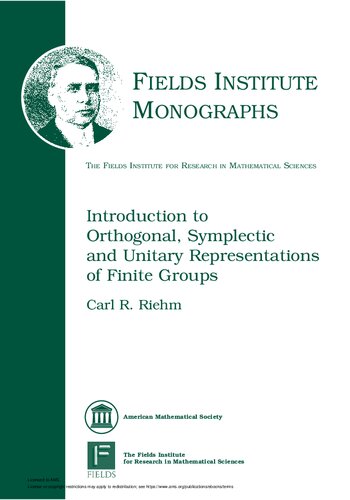

Most ebook files are in PDF format, so you can easily read them using various software such as Foxit Reader or directly on the Google Chrome browser.
Some ebook files are released by publishers in other formats such as .awz, .mobi, .epub, .fb2, etc. You may need to install specific software to read these formats on mobile/PC, such as Calibre.
Please read the tutorial at this link: https://ebookbell.com/faq
We offer FREE conversion to the popular formats you request; however, this may take some time. Therefore, right after payment, please email us, and we will try to provide the service as quickly as possible.
For some exceptional file formats or broken links (if any), please refrain from opening any disputes. Instead, email us first, and we will try to assist within a maximum of 6 hours.
EbookBell Team

0.0
0 reviewsOrthogonal, symplectic and unitary representations of finite groups lie at the crossroads of two more traditional subjects of mathematics--linear representations of finite groups, and the theory of quadratic, skew symmetric and Hermitian forms--and thus inherit some of the characteristics of both.
This book is written as an introduction to the subject and not as an encyclopaedic reference text. The principal goal is an exposition of the known results on the equivalence theory, and related matters such as the Witt and Witt-Grothendieck groups, over the "classical" fields--algebraically closed, real closed, finite, local and global. A detailed exposition of the background material needed is given in the first chapter.
It was A. Fröhlich who first gave a systematic organization of this subject, in a series of papers beginning in 1969. His paper Orthogonal and symplectic representations of groups represents the culmination of his published work on orthogonal and symplectic representations. The author has included most of the work from that paper, extending it to include unitary representations, and also providing new approaches, such as the use of the equivariant Brauer-Wall group in describing the principal invariants of orthogonal representations and their interplay with each other.
Titles in this series are co-published with The Fields Institute for Research in Mathematical Sciences (Toronto, Ontario, Canada).